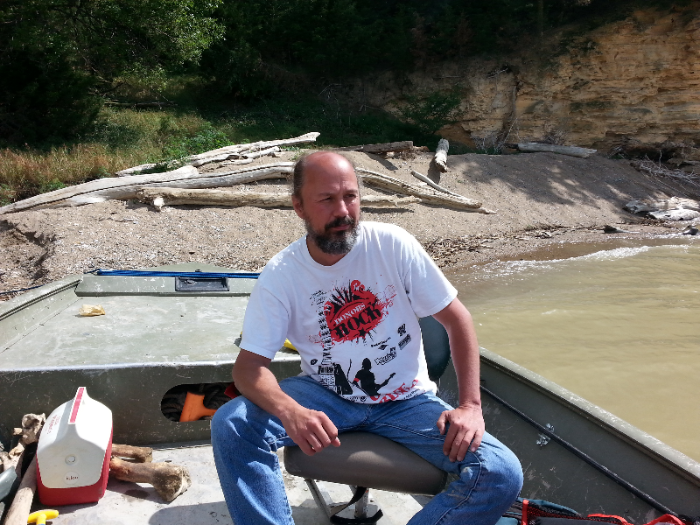Attention A T users. To access the menus on this page please perform the following steps.
1. Please switch auto forms mode to off.
2. Hit enter to expand a main menu option (Health, Benefits, etc).
3. To enter and activate the submenu links, hit the down arrow.
You will now be able to tab or arrow up or down through the submenu options to access/activate the submenu links.
Locator
Contact
Search
VA »
Health Care »
Multiple Sclerosis Centers of Excellence
» Veterans » Veteran Stories
»
Life is What You Make It!
Multiple Sclerosis Centers of Excellence
Life is What You Make It!
Matthew McCullor –- Sarpy County, Nebraska
I was diagnosed with MS in the year 2000, in my 14th year of service in the Air Force. I was medically retired in 2004, after 18 years, 2 months and 7 days of military service. When I was first diagnosed I wasn’t sure what that meant to me. I was aware of MS, I had been doing the National MS Society MS Walk since the late 1980’s. I wasn’t sure if I should be mad, scared, worried… I honestly didn’t know what I needed to be. MS affects everyone so differently, how was it going to affect me?
I do know that in the first three months, I didn’t want to bring anybody down. I withheld the diagnosis from my wife and kids for 3 months. I did this because I knew that they would be sad and worried, all those emotions and there was nothing that I or they could do about curing MS. I found myself worrying about my future a lot, not concerning what may happen to me with my MS, but what I might miss out on in life. I came to the conclusion that I needed to accomplish some stuff that I’d been dreaming about my whole life.
In 2002, I graduated with my Bachelor’s Degree in Anthropology. I was finally on the road to be an archaeologist. In 2009 I got my Master’s Degree in Anthropology, focused on Archaeology. I worked in the federal service as an archaeologist until 2017. Short-term memory troubles, attention disorders and not being able to walk long enough to do archaeology fieldwork or through tall grass and downed trees, caused me to retire.
Following my retirement, I again started to think about what was important to me, focusing on what I needed to accomplish before I was physically and/or mentally unable to do so. Travel was a big interest and concern for me. I needed to get to see my son and daughter, on the opposite side of the country, on a regular basis. They were an important part of my life, and my grandchildren were growing up very quickly and I was missing it. Traveling to see my family turned into a way for me to accomplish some of my dreams.
Traveling to different cities, checking out new museums, touring Civil War sites and other historic features of the country became very important to me. Since I no longer work, I have traveled what I consider extensively. I have driven from one side of the country to the other, watching baseball games, visiting the gravesites of US presidents, touring historical sites and attending archaeological conferences. While I travel I need to constantly keep aware of handicap accessible rooms in hotels, museums, baseball fields and you know, just about everywhere I want to visit. I use a wheelchair, so this became just one of the many steps I need to take when I plan trip.
Through my life and travels, I’ve learned that I need to enjoy life and I want to make a difference in the lives of others. I’m not important enough to have a big statue made for me, so I am trying to leave my legacy in the idea that I brought a smile to anybody that I’ve come across. I try to break large goals into smaller goals, making them more manageable. I take advantage of what has been given to me and find joy in the daily tasks of living. If I see something interesting in my travels, I don’t pass it up thinking I’ll get another chance. I take advantage of every opportunity that crosses my path.
Having a good attitude helps my mental state stay pretty even, relaxed and fun. When I talk to individuals that I don’t know, and they have a smile on their face when I’m done, I feel that on that day, I made them feel a little happier. We should all look on the bright side; I have MS but it hasn’t stopped me from doing so many of the things that are important to me. I’ve toured dinosaurs with my grandsons and seen waterfalls with my great-granddaughter. Life is good.

































